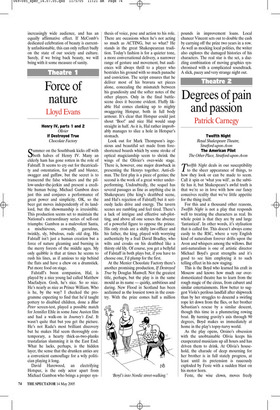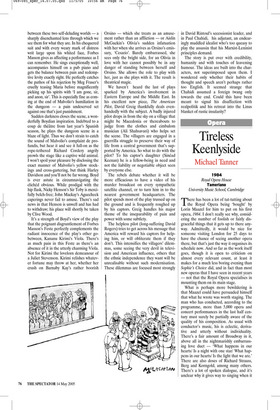Degrees of pain and passion
Patrick Carnegy
Twelfth Night Royal Shakespeare Theatre, Stratford-upon-Avon The American Pilot The Other Place, Stratford-upon-Avon
Twelfth Night deals in our susceptibility to the sheer appearance of things, to how they look or can be made to seem. Call it spin or ‘what you will’, as the subtitle has it, but Shakespeare’s awful truth is that we’re so in love with how our fancy conceives reality that we’ve little appetite for the thing itself.
For this and a thousand other reasons, Twelfth Night is not a play that responds well to treating the characters as real. Its whole point is that they are by and large ‘fantastical’. In other words, it’s stylisation that is called for. This doesn’t always come easily to the RSC, where a very English kind of naturalism forever drifts upon the Avon and whispers among the willows. But anti-naturalism is one of artistic director Michael Boyd’s great strengths and it’s good to see him employing it to such telling effect in his new staging.
This is the Boyd who learned his craft in Moscow and knows how much our overdomesticated theatre has to learn from the rough magic of the circus, from cabaret and similar entertainments. How better to suggest Viola’s perilous landfall after shipwreck than by her struggles to descend a swirling rope let down from the flies, or her brother Sebastian’s rescue by a similar descent, though this time in a plummeting rowing boat. By turning gravity’s axis through 90 degrees, Boyd makes us immediately at home in the play’s topsy-turvy world.
As the play opens, Orsino’s obsession with the unobtainable Olivia keeps his exasperated musicians up all hours and has driven them to drink. At Olivia’s household, the charade of deep mourning for her brother is in full stately progress, at least until its pretension is raucously exploded by Feste with a sudden blast on his motor horn.
Feste, the wise clown, moves freely between these two self-deluding worlds — a sharply disenchanted lens through which we see them for what they are. In his chequered suit and with every weary mark of distress writ large upon his whited face, Forbes Masson gives as affecting a performance as I can remember. He sings exceptionally well, accompanies himself on a pub piano and gets the balance between pain and redemptive levity exactly right. He perfectly catches the pathos of his rejection by Meg Fraser’s cruelly teasing Maria before magnificently picking up his spirits with ‘I am gone, sir, and anon, sir’. This is especially fine as coming at the end of Malvolio’s humiliation in the dungeon — a pain undeserved set against one that’s just punishment.
Sudden darkness closes the scene, a wonderfully Boydian inspiration. Indebted to a coup de théâtre from last year’s Spanish season, he plays the dungeon scene in a blaze of light. Thus we don’t strain to catch the sound of Malvolio’s complaint de profundis, but hear it and see it full-on as the rope-tethered Richard Cordery angrily prowls the stage like a captive wild animal. I won’t spoil your pleasure by disclosing the exact manner of Malvolio’s yellow stockings and cross-gartering, but think Harley Davidson and you’ll not be far wrong. Boyd is ever astute in circumnavigating the clichéd obvious. While prodigal with the hip flask, Nicky Henson’s Sir Toby is mercifully belch-free; John Mackay’s Aguecheek caperings never fail to amuse. There’s sad news in that Henson is unwell and has had to withdraw; his place will shortly be taken by Clive Wood.
It’s a strength of Boyd’s view of the play that the poignant disgruntlement of Forbes Masson’s Feste perfectly complements the radiant innocence of the play’s other gobetween, Kananu Kirimi’s Viola. There’s as much pain in this Feste as there’s an absence of it in the utterly charming Viola. Not for Kirimi the lovelorn demeanour of a Juliet Stevenson. Kirimi relishes whatever fortune may throw at her, whether her crush on Barnaby Kay’s rather boorish Orsino — which she treats as an amusement rather than an affliction — or Aislín McGuckin’s Olivia’s sudden infatuation with her when she arrives as Orsino’s emissary, ‘Cesario’. Barely embarrassed, she sees only the bright side, for an Olivia in love with her cannot possibly be in any danger of standing between herself and Orsino. She allows the role to play with her, just as she plays with it. The result is theatrical magic.
We haven’t heard the last of plays sparked by America’s involvement in Eastern Europe and the Middle East. In his excellent new piece, The American Pilot, David Greig thankfully deals evenhandedly with the subject. A badly injured pilot drops in from the sky on a village that might be Macedonia or thereabouts to judge from the clothes and cimbalom musician (Ali Shahsavari) who helps set the scene. The villagers are engaged in a guerrilla struggle to preserve their way of life from a central government that’s supported by America. So what to do with the pilot? To his captor’s daughter (Sinéad Keenan) he is a fellow-being in need and not the liability or negotiable object seen by everyone else.
The rebels debate whether it will be more efficacious to have a video of his murder broadcast on every sympathetic satellite channel, or to turn him in to the nearest government headquarters. The pilot spends most of the play trussed up on the ground and is frequently roughed up by his captors. Greig handles his major theme of the inseparability of pain and power with some subtlety.
The helpless pilot (long-suffering David Rogers) tries to get across his message that America will reward his captors for helping him, or will obliterate them if they don’t. This intensifies the villagers’ dilemmas, some seeing the very devil in television and American influence, others that the ethnic independence they want will be unrealisable without such modernisation. These dilemmas are focused most strongly in David Rintoul’s secessionist leader, and in Paul Chahidi, his adjutant, an endearingly muddled idealist who’s too queasy to play the assassin that his Marxist-Leninist principles demand.
The story is put over with credibility, humanity and with touches of leavening humour. The ideas are built into the characters, not superimposed upon them. I wondered only whether their habits of thought and speech aren’t perhaps rather too English. It seemed strange that Chahidi assumed a foreign twang only towards the end. Could this have been meant to signal his disaffection with realpolitik and his retreat into the Linus blanket of rustic insularity?



































































 Previous page
Previous page